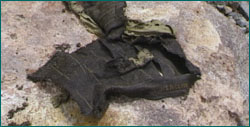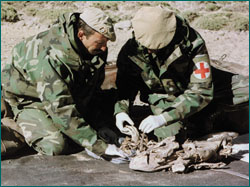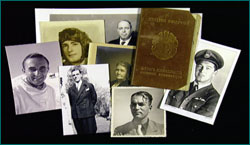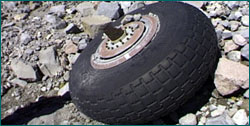 |
 |
Solve the Mystery of STENDEC
1947 Official Accident Report
Page 3 | Back to Page 2
(ii) The First Officer
Mr. N.H. Cook was born on October 30th, 1916. He held a Pilot's "B"
Licence No. 24146 issued on January 9th 1947, endorsed for Dakota
and valid until November 8th, 1947. The York and Lancastrian
endorsements are dated May 23rd, 1947. He also held First Class
Navigator's Licence No. 1807 issued on May 25th, 1947 and valid
until June 8th, 1948. His total flying time with the R.A.F., with
other than the R.A.F., and with the B.S.A.A.C. was 2,129 hours 05 minutes.
R.A.F. and other than R.A.F. Experience
Time flown as pilot.
Day: 1,436 hrs.
Night: 297 hrs.
Total: 1,733 hrs.
B.S.A.A.C. Experience
Total flying time as Aircraft Officer: 396 hrs. 05 min.
|  Fifty-odd years in a glacier has preserved this
tattered piece of clothing from Stardust.
Fifty-odd years in a glacier has preserved this
tattered piece of clothing from Stardust.
|
This was as follows:
Flying time in Lancastrian aircraft.
Day: 93 hrs. 45 min.
Night: 33 hrs. 42 min.
Total: 127 hrs. 27 min.
Flying time in York aircraft.
Day: 175 hrs. 14 min.
Night: 93 hrs. 24 min.
Total: 268 hrs. 38 min.
[page 6]
This incomplete service (C.S. 59) was Mr. N.H. Cook's first crossing of the
Andes.
(iii) The Second Officer
Mr. D.S. Checklin was born on May 29th, 1920. He held Pilot's "B"
Licence No. 24205 issued Jamuary 20th 1947, endorsed for York
aircraft and valid until November 19th 1947. The Lancastrian
endorsement is dated May 8th, 1947. His total flying time as a pilot
in the R.A.F. and B.S.A.A.C. was 2,074 hours 14 minutes.
R.A.F. Experience
Time flown as pilot
Day: 1,443 hrs.
Night: 356 hrs.
Total: 1,799 hrs.
Time flown as pilot in Lancastrian aircraft.
Day: 14 hrs.
Night: 8 hrs.
Total: 22 hrs.
 An Argentine military
doctor examines human remains at the crash site.
An Argentine military
doctor examines human remains at the crash site.
|
|
Time flown as pilot in York aircraft.
Day: 511 hrs.
Night: 86 hrs.
Total: 597 hrs.
B.S.A.A.C. Experience
Total flying time: 275 hrs. 14 min.
This was as follows:
Flying time in Lancastrian aircraft.
Day: 11 hrs. 47 min.
Night: 30 min.
Total: 12 hrs. 17 min.
Flying time in York aircraft.
Day: 180 hrs. 14 min.
Night: 82 hrs. 43 min.
Total: 262 hrs. 57 min.
Mr. Checklin had previously crossed the Andes Mountains on four
occasions.
(iv) Radio Officer
Mr. D.B. Harmer was born on October 5th 1919 and served in the
R.A.F. for three years as wireless operator (Ground Duties). He held a P.M.G.
Aircraft Radio Operator's Licence No. 1011 issued on October 17th
1946. He joined B.S.A.A.C. in November 1946, and has since flown a total of 615
hours 26 minutes by day and night including six trans-Andean crossings.
|  Some of the 11 passengers and crew who flew on
Stardust's final flight.
Some of the 11 passengers and crew who flew on
Stardust's final flight.
|
(v) The Star Girl
Miss Iris Morcen Evans was born on September 8th 1920 and served
five years as Chief Petty officer in the W.R.N.S. She joined the B.S.A.A.C. in
February 1947, and as Air Hostess had flown 265 hours 34 minutes by day and
night but had not previously crossed the Andes.
(e) The Weather
The route forecast from Buenos Aires to Santiago was based on the 2,000 hours
synoptic chart of the previous day, and the latest available actual reports
which arrived to date read:
Buenos Aires 1300 hrs.—August 2nd 1947.
Forecast for route Buenos Aires to Santiago:
State of Sky—Buenos Aires to Mendoza: dispersed cloud; overcast in the
passes. Santiago: dispersed irregular low cloud.
Cloud Base—Buenos Aires to Mendoza clear. Zero in the passes (cloud on the
surface).
Horizontal Visibility—Clear up to Mendoza; passes closed.
Upper Winds—W. 17/22 knots rotating to N.W. 17 knots towards Mendoza; S.W.
33 knots in the passes.
Special Phenomena—Snow storms in the Andes Mountains with moderate to
intense turbulence.
Conditions of flight—Visual contact with the ground up to Mendoza;
conditions in the passes unfit for visual contact or instrument flying.
The Actual for Mendoza at 1800 hrs.
Overcast with blue holes. Alto cumulus and alto stratus. A large layer of cloud
existed between 10,000 feet and 20,000 feet.
Note: It is very doubtful whether at Mendoza the pilot could have seen the
ground by visual observation at all.
 One of Stardust's wheels, still
fully inflated after more than half a century.
One of Stardust's wheels, still
fully inflated after more than half a century.
|
|
[page 7]
(g) Oxygen system
The oxygen system was fully charged including nine emergency bottles before the
aircraft's departure from Buenos Aires. In addition, each point was checked for
correct functioning. A duplicate check was carried out by the First Officer
immediately prior to departure.
4) CONCLUSIONS
1. All licences held by the Captain and crew were valid.
2. A daily inspection of airframe and engines was carried out and a certificate
of safety issued in respect of them in Buenos Aires prior to the
take-off.
3. The documents required by the regulations to be carried in the aircraft were
in order.
4. Sufficient fuel was carried for the flight.
5. The all-up weight of the aircraft was within the prescribed limits.
6. The C. of G. was within the prescribed limits.
7. High altitude flying equipment was carried and was in order and the crew
were trained to use it.
8. As this was the pilot's first trans-Andean flight in command, and in view of
the weather conditions, he should not have crossed by the direct route.
5) OPINION
Through lack of evidence due to no wreckage having been found the actual cause
of the accident remains obscure. The possibility of severe icing cannot be
ignored.
Vernon Brown
Air Commodore
Chief Inspector of Accidents
Accidents Investigation Branch
Ministry of Civil Aviation
22nd December, 1947
STENDEC Theories
Tapping into Morse Code
1947 Official Accident Report
Readers' Theories
Solve the Mystery of STENDEC |
Mysterious Plane Crashes
Reading the Wreckage |
Inside the Jet Stream |
Resources
Transcript |
Site Map |
Vanished! Home
Editor's Picks |
Previous Sites |
Join Us/E-mail |
TV/Web Schedule |
About NOVA
Watch NOVAs online |
Teachers |
Site Map |
Shop |
Search |
To print
PBS Online |
NOVA Online |
WGBH
© | Updated June 2001
|
|
|